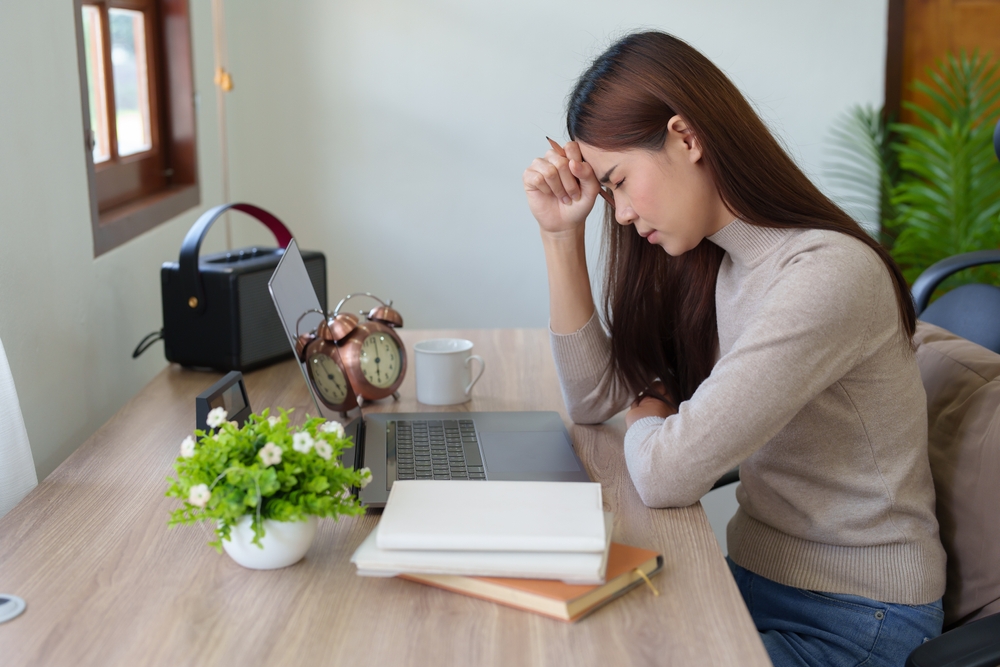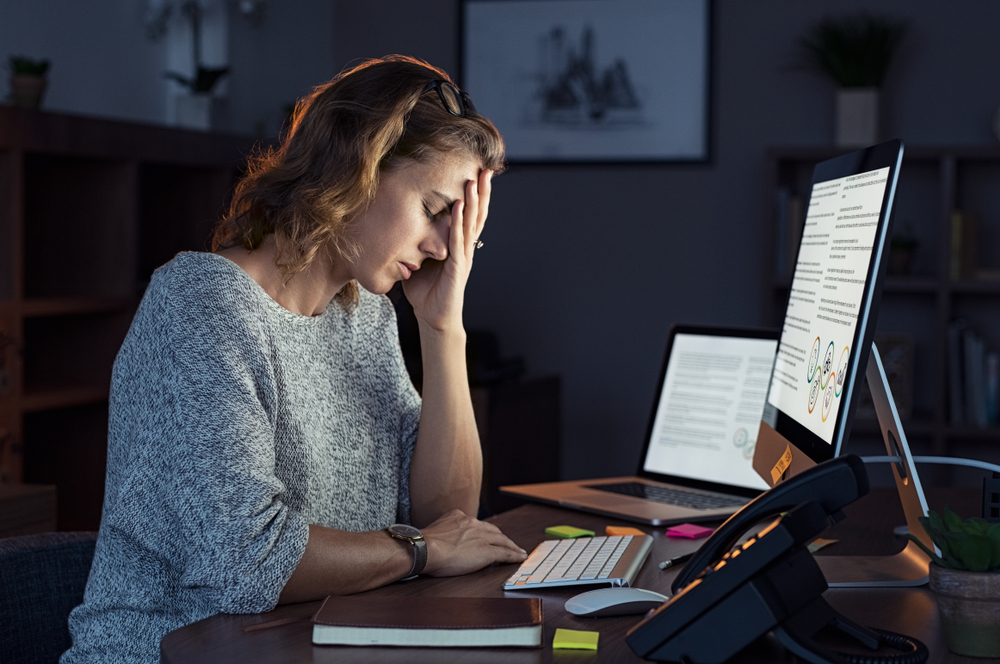13 Daily Habits That Drain Your Energy Without You Realizing
Everyone has habits that affect their energy levels, sometimes without even realizing it. You may be doing things daily that leave you feeling drained by the end of the day. It is easy to overlook these habits, but they can quietly wear you out. Some of these habits could be sabotaging your productivity without you noticing. By becoming aware of these energy-draining activities, you can make small changes for a healthier, more energized life.
This post may contain affiliate links, which helps keep this content free. Please read our disclosure for more info.
Skipping Breakfast

Starting your day without breakfast can lead to low energy levels later. Your body needs fuel to function properly, and skipping a meal means your energy reserves are low. A healthy breakfast helps maintain blood sugar levels, which keep you alert and energized. Instead of skipping breakfast, try eating foods that combine protein, fiber, and healthy fats. This will help you stay focused and energized throughout the day.
Not eating in the morning can also affect your metabolism, leading to overeating later on. If you are short on time, consider grabbing something quick like a smoothie or yogurt. Making time for a nutritious breakfast will set a positive tone for the rest of the day. Small changes like these can help your body work efficiently, keeping your energy steady. You will notice the difference in how you feel by incorporating this habit.
Overusing Caffeine

While caffeine can give a quick energy boost, it can also cause crashes later in the day. Over-relying on coffee or energy drinks leads to fluctuating energy levels, leaving you tired once the effects wear off. Instead of having multiple cups of coffee, try switching to green tea or herbal teas with natural, gentle caffeine. Reducing caffeine intake can help you avoid the energy rollercoaster and maintain a steady focus.
If you drink caffeine late in the day, it can also interfere with your sleep cycle, leaving you feeling tired the next morning. To avoid this, try limiting your caffeine intake to earlier in the day. Gradually cutting back on your caffeine consumption can also help reduce the dependency. This allows your body to naturally wake up and stay energized without the need for constant caffeine boosts. You may feel more balanced and alert once you reduce your reliance on it.
Procrastinating

Procrastination can leave you feeling mentally drained by piling up tasks you have yet to complete. The longer you delay, the more anxious and overwhelmed you become. Taking action right away, even with small steps, can help reduce the stress and conserve your energy. Break down your tasks into smaller chunks to make them feel more manageable.
To avoid procrastination, set clear goals for yourself and create a timeline. Focus on finishing one task at a time rather than multitasking. When you finish tasks on time, you will feel more accomplished and less drained. By making these simple changes, you can avoid the energy drain that procrastination brings. Taking control of your tasks early in the day keeps your mind at ease and your energy intact.
Sitting for Long Periods

Sitting all day without moving can cause fatigue, as it reduces blood flow and makes your body feel sluggish. Staying seated for too long also causes your muscles to stiffen, leading to tiredness and discomfort. To avoid this, make it a habit to take short breaks and stretch throughout the day. Even just standing up for a minute or walking around the room can help recharge your energy.
Incorporating movement into your day can help increase circulation, making you feel more awake. Consider using a standing desk or taking a walk during lunch breaks. Small adjustments like these keep your body active and your energy flowing. Staying active throughout the day reduces fatigue and increases focus. A few minutes of movement every hour can keep your energy up and prevent that sluggish feeling.
Poor Posture

Slouching or sitting hunched over can strain your muscles and lead to fatigue. Poor posture reduces oxygen flow and can create tension, which saps your energy. To avoid this, practice sitting and standing tall, engaging your core muscles. Proper alignment improves blood circulation and reduces muscle strain, helping you feel more awake.
To maintain good posture, keep your feet flat on the floor, shoulders back, and your head aligned with your spine. This simple change can help improve your energy levels throughout the day. By being mindful of your posture, you reduce the chances of experiencing aches and discomfort. This habit will allow you to feel more comfortable, focused, and energetic. Practicing good posture supports your body and keeps you feeling alert.
Skipping Exercise

Skipping regular exercise can leave you feeling drained. Physical activity helps release endorphins, the body’s natural energy boosters. Lack of exercise can lead to sluggishness and mental fog, making it harder to stay focused. By scheduling at least 20 minutes of exercise each day, you can increase your energy levels and improve overall health.
Exercise also promotes better sleep, helping you feel more rested and alert the next day. You do not have to commit to long workout sessions; even short walks, yoga, or stretching can be beneficial. Regular movement reduces stress and improves mood, leaving you with more energy for daily tasks. It is important to find an activity you enjoy so it feels less like a chore. Consistency is key to keeping your energy levels up.
Eating Too Much Sugar

Consuming high amounts of sugar can cause spikes and crashes in your blood sugar, leaving you feeling tired. These fluctuations can lead to mood swings and irritability, making it harder to stay productive. Instead of reaching for sugary snacks, try eating complex carbohydrates, fruits, or protein-rich snacks to maintain stable energy levels.
High sugar intake can also lead to long-term health issues, such as weight gain and diabetes. Reducing sugar in your diet can help prevent energy crashes and promote more consistent energy throughout the day. If you are craving something sweet, try substituting sugary treats with healthier options like fruit or nuts. Making small changes to your diet can have a big impact on your energy and overall health. You will feel more energized and focused by cutting back on sugar.
Not Drinking Enough Water

Dehydration is one of the most common causes of fatigue. When you do not drink enough water, your body struggles to maintain energy levels and can become sluggish. To avoid this, make sure to drink enough water throughout the day. Carry a water bottle with you to remind yourself to stay hydrated.
If you feel fatigued, try drinking a glass of water before reaching for caffeine or snacks. Hydrating regularly helps your body function at its best, keeping you feeling fresh and alert. Water also supports digestion, brain function, and overall health, which all contribute to your energy levels. By staying hydrated, you can prevent fatigue and stay focused for longer periods. Make hydration a priority to keep your energy levels stable.
Watching Too Much TV

Spending long hours in front of a screen can drain your energy, especially when you are watching shows or movies for extended periods. The blue light from screens can disrupt your sleep cycle, leaving you feeling more tired the next day. To avoid this, try limiting screen time, especially before bed.
Instead of binge-watching, you could engage in more energizing activities, like reading or taking a walk. The habit of watching TV for hours on end can also reduce physical activity and promote sedentary behavior. Balance your screen time with other activities that recharge your energy. Reducing TV time can help you feel more awake and rested, rather than drained and sluggish.
Overworking Without Breaks

Working for hours without taking breaks can lead to burnout and fatigue. Continuous focus on tasks can deplete your energy, making it difficult to maintain productivity. To avoid this, take short breaks every hour to rest your mind and body.
Taking a few minutes to stretch, walk around, or simply relax can help restore your energy and improve your focus. Overworking without breaks can also lead to increased stress levels, which further drains your energy. By pacing yourself and allowing for small breaks, you can sustain energy levels and stay more productive throughout the day. Incorporating these moments of rest ensures you do not run out of steam before your day ends.
Spending Time with Negative People

Being around people who are constantly negative can drain your energy and affect your mood. Their attitude can create stress and lead to feelings of exhaustion. To avoid this, try to spend more time with positive and supportive individuals who uplift you.
While it is not always possible to avoid negative people, limiting exposure to them can make a big difference. Surrounding yourself with those who have a positive outlook can help maintain your own energy levels. Focus on creating healthy relationships and setting boundaries with people who bring negativity into your life. This shift in your social interactions can lead to better energy and emotional well-being.
Not Getting Enough Sleep

Lack of sleep is one of the most significant contributors to low energy levels. When you do not get enough rest, your body cannot recover, and fatigue sets in. To avoid this, aim for 7 to 9 hours of sleep each night.
Create a bedtime routine to help improve the quality of your sleep, such as limiting screen time and reducing caffeine intake before bed. Getting enough sleep restores your body and mind, preparing you for the day ahead. If you wake up feeling tired, it may be a sign that your sleep quality needs improvement. Prioritize rest to ensure you have the energy to face the day.
Multitasking

Multitasking may seem like a way to get more done, but it actually leads to mental exhaustion. Constantly switching between tasks reduces focus and lowers productivity. To avoid energy drain, focus on one task at a time and complete it before moving on to the next.
When you multitask, your brain has to constantly refocus, which can lead to burnout and fatigue. By giving your full attention to each task, you can work more efficiently and conserve your energy. Try breaking your day into blocks of focused work, allowing yourself time to complete tasks without distractions. By reducing multitasking, you will feel more energized and productive throughout the day.
This article originally appeared on Avocadu.
